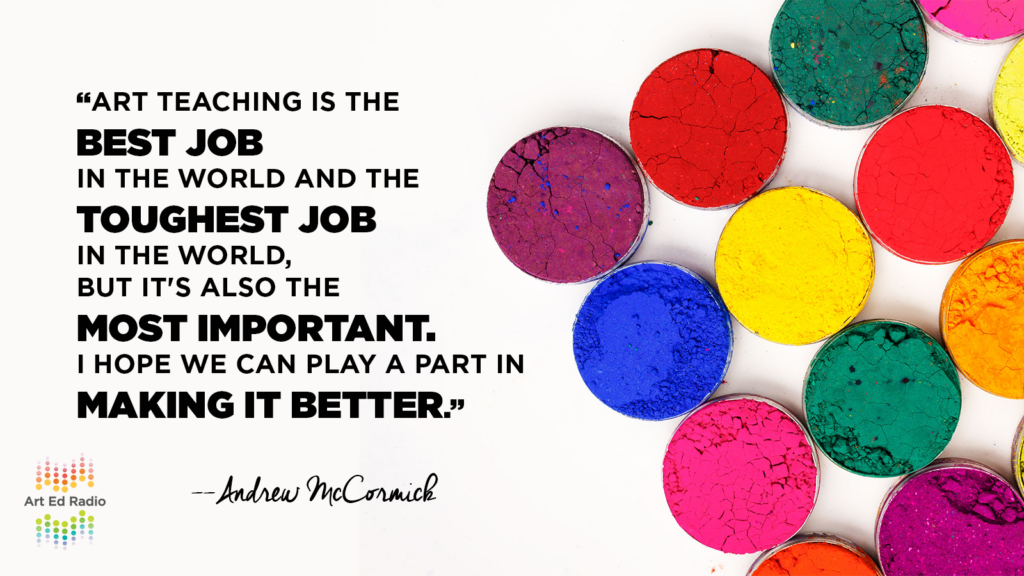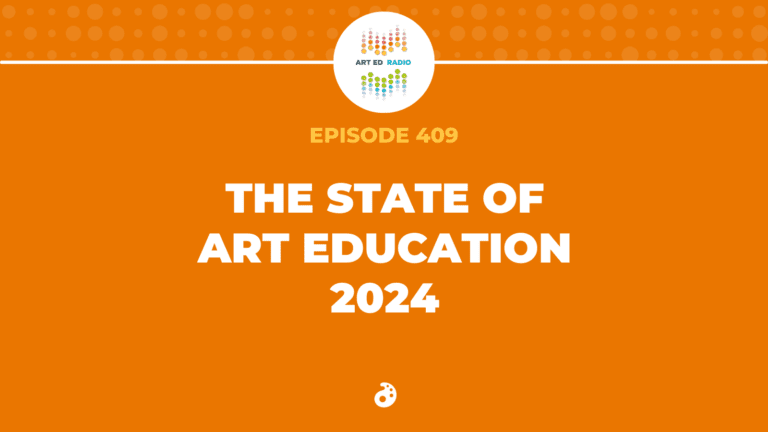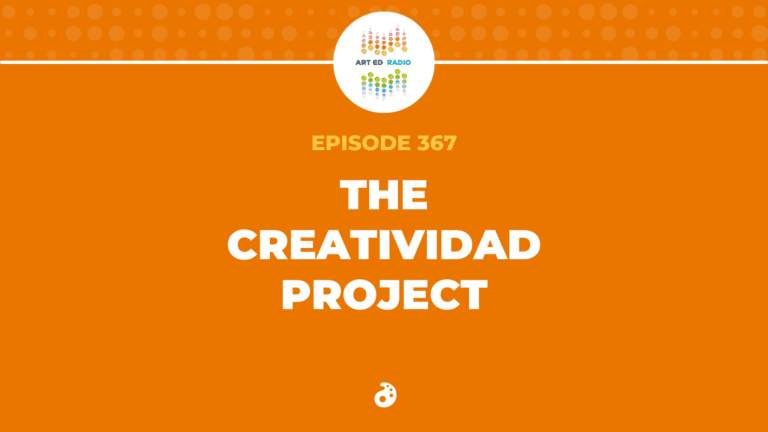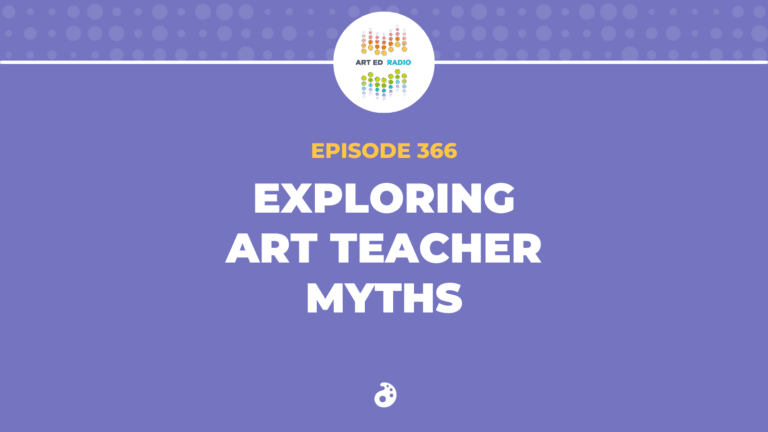All good things must come to an end, and after two years of podcasts, Andrew is saying goodbye as a host of Art Ed Radio. In his final episode, Tim comes on to reminisce and talk about everything they’ve done together in the past few years. They discuss some of their favorite episodes (8:15), the times they’ve invited some controversy (12:15), and their hopes for the future of the show (19:00). Full episode transcript below.
Resources and Links
- In case you want to check out an old episode of AOE Live, this is a good one.
- Going back to the first episode of Art Ed Radio
- One of Andrew’s favorite episodes, on procrastination and creativity

Transcript
Welcome to Art Ed Radio, the podcast for art teachers. This shows produced by The Art of Education, and I’m your host Andrew McCormick.
Well, this is it, episode 104, exactly two years of weekly Art Ed Radio Podcasts. What a milestone and what a fun ride it’s been to do this with Tim. You know, as I mentioned last week this episode is going to be the last one that I host, doing the intro, being that person that who asked the questions in the outro. But I still come on every once in a while to chat with my good buddy, Tim.
It has been such a thrill and such a professional accomplishment for me to be a creator of something like this. I always try to tell my students that being a creator, or an uploader if you will, is so much more fun and way more cooler … more cooler, than being a simple downloader or consumer of content.
I’m such a huge fan of podcasts that … It was about three years ago that I really got the itch to make one and Derek and Jessica, at The Art of Education and all the other awesome folks at AOE, Tim, Abby, Cindy, Michael, our sound guy, were so kind and welcoming in helping me make that dream of mine a reality.
As I’m wrapping up this podcasting thing, I wanna take one last moment to plug something that I truly believe in. This isn’t just something I have to say, I truly believe it and it’s The Art of Education. Tim and I, often will come on here and tell you about a specific class or conference talk that you’re gonna love, and we really mean it. We see first-hand how people use and benefit from all the great content that AOE has to offer.
I know AOE totally saved my bacon this last summer. I know it maybe be shocking to some of you to hear this, but I totally procrastinated on getting my teaching license renewed. I was able to take three classes last summer, log seven credits all via AOE, and I learned a ton that I was able to apply to my classes this year right away.
One of the things that I love about AOE classes, and I say this to anyone, whoever is listening to me, they’re just right. And I know this firsthand because my wife just recently started an online masters program this fall, and the workload for this one little introductory class, is just ridiculous. And she was really frustrated and I kind of looked back on my experience with AOE this summer, I was like, “Yeah, mine was just right.” And the frustrating this is that I think that a lot of universities don’t understand that people have other jobs, and maybe taking other classes as well, are parents and have all the responsibilities that come along with that. So, with AOE you’re definitely gonna do some heavy lifting, and you’re gonna be reworking and rethinking all that you do in your classroom, but at the end of the day you still have enough energy and sanity left over to still be a full time teacher, to be a full time parent.
So, if you’re listening to this podcast and you haven’t taken an AOE class yet, what are you waiting for? They’re ridiculously relevant, affordable, doable. So, head on over to AOE and check out all their great classes and get your learning on.
All right. So, today’s episodes gonna be just a little weird. It’s gonna be mostly Tim and I, kind of reminiscing about all the things that we’ve done in the two plus years together. Things we’ve learned, times we’ve disagreed, favorite episodes. Come along for a little nostalgic Art Ed Radio ride.
Well, alright Tim, I’m bringing you on, man. This is like my last rodeo of hosting a podcast.
Tim: I know, I’m shedding a single tear as we speak.
Andrew: Man, I know you’re so full of crap. It’s been a lot of fun but it’s not gonna be the end of me getting on airwaves and blabbing about art education, I just won’t be hosting them nearly so much. So, I won’t be blabbing as much, I won’t be doing the into and outro, but man if you bring me on and give me microphone I’m gonna be full of hot air as ever.
Tim: Well, we all know that’s the case. And really, I think you just need to admit to everybody, you’re taking the easy way out, you’re making me do all the work for these episodes, and hosting them, doing the intros, doing the outros, and you just come on and talk about whatever, and making your life a lot easier, right?
Andrew: It is. But if we’re being totally honest with the listeners, it’s been like that ever since the beginning. You’ve been the brain and I’ve been like the pretty one, right?
Tim: I suppose.
Andrew: You have always, since we’ve started this, done more work than I have, and inordinate amount, so hats off to you. Every time I think we get together with an AOE gathering there’s always like, what are you thankful for? What are you thankful for? And my answer is always Tim Bogatz because Tim Bogatz makes me look a lot better and sound a lot smarter than I am. So-
Tim: Well, thank you. I think the same could be said for you. But, I don’t know, as long as we put out a good show then I’m happy to do whatever.
Andrew: Yeah.
Tim: So, I think we’re good.
Andrew: Man, this is gonna be kind of a nostalgic episode were we get to kind of like take a self- congratulatory final lap around things. But we’ve been working together for a long time and it’s been a lot of fun.
Tim: We have and this is two years of episodes, so that’s a pretty big milestone. But quick shout out to everybody who went all the way back with us to our AOE Live days.
Do you have … you wanna share some memories about AOE Live?
Andrew: I just remember every video … Here’s what I remember, and some of it’s helped because you can probably still find it all on YouTube. I always was incredibly panicked, sweaty, and stressed out because it’s like, oh god it’s live, and there’s tech issues, and Derek, we love him but he’s always like, “Hey guys, half hour before you go on try this new platform, it’ll be great.” And it was like, “I don’t know what we’re doing.” So, I think in every video I look just really hot and sweaty, and I don’t know why anyone would ever want to watch me talk for 45 minutes. So, I was so happy when we kind of figured out the … going away from kind of the live video platform, and every other week, to then just audio only, every week, that was like a really smart choice that we kind of did that.
Tim: Yeah, I think that works pretty well. And just to kind of set the stage for everybody, those of you that don’t know, AOE Live was just every other week live show, before Facebook live even existed, we were ahead of our times. And Derek, is Derek Balsley the CEO of The Art of Ed. And we both wrote to him separately saying, “Hey, I would love to host a podcast for you guys.” And, right when I sent my letter, you sent a letter saying, “Hey, I’d love to host a podcast for you guys.” And so, he’s like, “Well, let’s put these two together.” And so, a lot of people don’t know, we didn’t even know each other-
Andrew: Right.
Tim: … before this whole thing started. And so, yeah we did almost a year of those live shows, and then took a short little hiatus and then jumped into this, and now we’re at two years of episodes together. So, it’s been a fun ride.
Andrew: Yeah, for sure. And it was … I mean, I thought we came together pretty well early on, we did like a pilot and it was awful and we got lots of notes, and it’s like, “Why the heck are you guys talking for an hour and a half about grading practices? This is so boring.” And I think we got a lot better, so yeah it’s been quite the ride.
Tim: Yeah, I think so. And I think the episode length that we usually have here 20, 25 minutes is really the way to go. So, let me ask … I mean, not to take over hosting your show here-
Andrew: I’ll let you.
Tim: I’m just thinking about some of those episodes and how far we’ve come from those first ones that maybe weren’t so good. But what have been some of your favorite episodes that we’ve done?
Andrew: Well, any … Okay. So, there’s two things that I think make a good episode for me, and I’m being serious here, that I like is, I do like it when we can have a little bit of dissension that’s honest and I think people know that sometimes we have dissension that’s like we’re kind of playing devils advocate and being a little extreme with each other. But when we have real like, hmm I don’t see it that way, I like that. And I also like episodes were I sometimes, and you sometimes, bring in stuff that is really relevant, like it just happened in my classroom. So, we’re able to talk about things that work for us, and things that we’re trying, and I’ve always really liked sharing things that are like super fresh, either the day of or the week of, that’s always been really fun for me. Now if you hold my feet to the fire and say, maybe some all time favorite episodes, I do really like the Creativity Requires Procrastination because I’m still-
Tim: Yes, that was one of our epic battles.
Andrew: I’m still sticking to my guns and I think procrastination is the secret sauce of creativity. But then, there’s an episode that we did, that I think is kind of a throwaway episode, and most people wouldn’t think of it. I think about it a lot and it’s … it kind of happened right around, I think, that same time, it was about imagination, and creativity, and originality, and is okay for students to make fan art? And I still find myself kind of grappling with that because it’s like, yes it’s not original but it what they wanna do, and it’s keeping them making stuff. And I don’t know, I think about that episode probably more than any others that we’ve ever done.
Tim: Interesting, because I had completely forgotten about that episode until you just brought it up. Yeah, that’s a good one. Let me throw a couple out there at you. I really enjoyed our Project Doctors episodes. We did two of those I think, where people wrote with like, “Hey, this project isn’t working for me, what would you do to fix it?” And I really enjoyed, I don’t know, kind of the advice column-
Andrew: Right.
Tim: … feel to those. I really enjoyed talking about all of those projects. And then, I always love our deep dives when we go into a specific media, where we just sit around and talk about drawing for 50 minutes, or I think we talked about ceramics over two episodes.
Andrew: Yeah.
Tim: And, you know, a sculpture or whatever, just really diving in. I really enjoyed those, as well.
Andrew: Yeah.
Tim: So, let me ask you, if we can go to the flip side though-
Andrew: Sure.
Tim.: … least favorite episodes. I mean, I know you like yourself but are there any that you didn’t enjoy?
Andrew: Well, I mean, any of the ones that I’m not on, I’m just like-
Tim: Oh, nice, nice.
Andrew: No, I actually was gonna say the deep dive episodes, they’re not my favorite. And I will say this, it’s because I find it hard to believe that, that could be entertaining for anyone else other than us. Who, you know, we are the ones doing the talking and I’m like, “Do people really give a crap about drawing medium, like 45 minutes in?” And they must, I guess they do, but … I mean, I like them but they don’t rank in the ones that I think skew a little bit more philosophical or whatever, about the purpose of art, or creativity, and originality. Those are the ones that kind of get me thinking and I dig a little bit more. So, I’d have to say the ones that are like … I don’t know. You know me, my personality, if it’s really practical I’m kind of like, “It’s nice, I guess.” But, you know, whatever.
Tim.: Yeah, you wanna look at the big picture though.
Andrew: Yeah.
Tim: So, I understand that. One, if I can bring it up, that I actually really loved but we were not popular people when this one came out, it was The Eight Things That Terrible Art Teachers Do.
Andrew: Yeah.
Tim: Do you remember that one? There was some really negative feedback because our whole idea was just, hey maybe these are some things that you could do better, you know? Trying to get people to kind of reflect on what they’re doing. But I feel like everybody just kind of saw that title and flipped out. And we also did a very poor job of explaining like, “Hey, next week we’re gonna talk about the eight things that amazing art teachers do.” We never said, “Hey, there’s a part two coming.” So, that looked bad and in retrospect I think we could’ve handled the rollout a little bit better with that one.
Andrew: Yeah, I mean I think it was scandalous and people kind of got up in arms but I mean, it did get people talking and thinking, but yeah we weren’t very popular for a while after that. And I blame you for that one, I think that was one that you handled, so.
Tim: Fair enough, fair enough. And kind of in that same vein, who are some of your favorite guest that we talk to, if we’re talking favorites, like who besides talking to me-
Andrew: Yeah.
Tim: … who else do you like having on the show.
Andrew: Well, I gotta tell you, and she was kind of a newer addition. And the reason I loved talking to her, and I think I talked to her on two different occasions, and maybe you talked to her once, Lindsey Moss. And one of the reasons I loved having Lindsey Moss on, was when I initially approached her, I think it was about what’s working well in elementary curriculum or something along those lines. She said, “Oh, I don’t know. You’re not gonna like my voice. I don’t have a voice for radio.” And I think her exact words in writing were, “Everyone tells me I sound like Kermit, the frog.” So, I’m thinking to myself like, “Oh my god, we’re gonna …” and of course me, a typical me episode, it’s like a week behind schedule, I’m like, “Screw it, I don’t care what she sounds like. She’s coming on the podcast because I am not-“
…and she has a totally fine voice. I don’t know who is telling Lindsey Moss that she doesn’t have a voice for radio, those people are haters, and she was awesome, and charming, and funny, and witty, and so smart, and she was a real good guest.
Tim: Yeah. She was just on, what two weeks ago?
Andrew: Hmm-mm-hmm
Tim: When we did the winter conference preview. And yeah, she’s awesome.
Andrew: Yep.
Tim: One that I really enjoyed hearing is anytime that you talked to Ian Sands. Ian always has great things to say, and I don’t always agree with him, but man he’s smart and has some really, really good ideas. So, he always makes me think. I always appreciate what he has to say. You guys did the censorship episode, I think it was called, The Slippery Slope of Censoring Student Artwork. Man, that was one of my favorites that I heard from you. So, a shout out to Ian.
Andrew: He’s always a provocateur and definitely gets people thinking. You know, I’ll be honest, he’s a guy that every time I go to talk to him, I’m always a little intimidated because I think he’s like … I don’t know if you feel the same way, but I think he’s real, real smart and he’s been one of my kind of art education idols and heroes for a while. And it’s kind of like fanboy interviewing your hero, and I always feel like I’m not exactly 100% myself because I’m a little like, “Oh, I don’t wanna screw up and sound stupid.” But actually one of my … I always like it when we can bring people on who actually aren’t in the art world, just to get a different perspective. And I think I had a couple opportunities to bring people on who were entrepreneurs, kind of like deep thinkers, about … not just art education, but the way the world is going, and business, and that stuff.
So, one of my favorite episodes was when we brought Mike Wagner on, which was kind of early on and he talked about growing creative leaders, and he had a really great quote from that episode about that creatives, I think, are like the … something about the word infection was in there. That we’re … the creative minds are the infections that we want to take hold in a school district and I was like, “That was awesome.” And I really enjoyed chatting with that guy back in the day.
Tim: Yeah, I remember that episode. Yeah, he was talking about how it’s our job to kind of put creativity in all of our kids, and just watch that sort of spread into all the other disciplines. I remember that one. Yeah, that was a really cool episode.
Andrew: I remember when we first started this thing, I have some really fond memories of going to AOE headquarters in Osage Iowa, and kind of plotting and scheming, okay 13 episodes, and what are some of the categories and topics gonna be. And we … I don’t know what it was but that first season everything dealt with death, and dead people, and it was the death of creativity-
Tim.: Yes, yes.
Andrew: … and dead white guys. And everything was about death, and gloom, and I just think that’s really … I don’t know why that’s a fond memory of mine, but-
Tim: No, I was gonna say I’m glad we’ve gotten past that at this point.
Andrew: Well, I mean, a little bit, I think we still wanna kind of push peoples buttons a little bit. I mean, even … we have things that art teachers hate, love it or shove it. So, I mean, teachers … You know, as a kid it’s like so weird to see that teacher out in the grocery store or something. Teachers are nuanced individuals, we have things that we despise, things that we hate, things that we begrudgingly do. And sometimes I don’t think, as teachers, it’s like, “Is it okay to talk about all the things that we don’t like doing, or that we hate, or that we think are stupid?” It’s kind of a one … it’s a counterpunch, I should say, not a one two punch.
Being a teacher requires so much positivity that sometimes you can get together and just be like, “Ah, I need to vent and talk about all the dumb things that I hate and can’t stand.” And I hope that we were an avenue for that, for some people driving to work every morning.
Tim: Yeah, I think that’s good. You can’t dwell too much in the negativity. But, like you said, it’s good to get it out there every once in a while.
Andrew: Yeah.
Andrew: Well, you know, I know that while I’m gonna be done kind of hosting, and plotting, and making ideas for the thing. I know that you’ll probably have me on from time to time when you can’t find any better, so I’ll still be kind of in peoples earbuds down the road. I think it’ll be interesting to think about a topic that we should do for the first time I come back on.
Tim: Oh, yeah. That’s good. Do you want something that has to do with death?
Andrew: Totally, sure. No, the funny thing is, one of the reasons why I’ve been contemplating stepping away from podcasting duties, and some work with AOE, is I actually kind of feel like I’m not really an art teacher anymore. And this may sound sad but it’s not sad. I’ve thought about like, it’s kind of the death of an art teacher. And here’s what I mean by that, and I’ll expand on this, and then you can like pick it up and run with it for a talk later, or just let it die. At my previous job I felt like I had a niche, and it was like Mr. Creativity, right? And now that I’m in a slightly different role in a different district, my role has changed, and I feel like I’m less important and less vital as an art teacher, and there’s other things that I need to do. And there’s other things that I need to do for my district that is kind of pulling me away from podcasting.
So, I don’t know that it’s a death but it’s kind of an evolution, you know. And I think that’s actually really interesting as teachers, when we’ve been teaching for a while, that we’re not the same person 15, 20 years into it, that we do start to evolve and change, and if we don’t have different beliefs we might even have completely different roles. You might talk to me in five, six years and I might flip over to the dark side and be in administration, I might be crazy, but I don’t know.
Tim: That would be crazy. But in the mean-
Andrew: Fast forward six years when you’ve slapped some sense into me and don’t let me do that, all right?
Tim: All right. Fair enough. Fair enough. But no, I think that is a good topic and maybe we can cover that in the near future.
Andrew: It would be cool. So, I wanna ask you to think as kind of we’re done in someways in doing this together, like I said, I’ll be on a little bit. Do you have some big takeaways in doing this podcast? What have you learned from it and then maybe I’ll kind of share some things that I’ve learned from it.
Tim: Well man, I just always appreciate the fact that you and I can look at the big picture together. They’re a lot of times that we dive into media, like we talked about, but more often than not we are talking a lot about philosophy and we’re questioning what we do, what we should be doing. And I hope that we’re encouraging people to reflect on what they’re doing in their classroom, what’s working for them, what maybe they can do better. And I think just being able to talk about those picture things, those challenging things is really gets me to reflect on what it means to be a good teacher. And I appreciate that I have somebody to talk about all those ideas with.
Andrew: That’s awesome. I’m trying to think. For me, I think this whole crazy idea of wanting to make a podcast started because I was such a fan of podcast. It’s been an honor, and this is gonna sound a little cheesy, it’s been an honor and a privilege to kind of be involved in this with you, and with AOE, and to be heard by people. I could not be more sincere when I say this, that what everyone does, who’s listening to this right now, being an art teacher, it is the best job in the world, it is the most important job in the world, and I think it’s the hardest job in the world. And because of that combination, I think it’s the most rewarding thing in the world. And I didn’t think that out there, there was an audio media that was like talking to people about this, about how important it is what they’re doing, and if you’re struggling it’s okay and here’s how not to struggle. I mean, it’s just been amazing to think that I’ve been, kind of, with you talking to people about this, and I know that we’ve only scratched the surface of the good work that people can do out there. But, like I said, I mean, it’s just been a real privilege. And it’s been like a whole lot of fun, man. It’s been awesome. So-
Tim: It has. I’ve loved every minute. And congrats on two years, man, that’s really awesome.
Andrew: Well that’s it folks. Thanks for Tim, for all the hard work and the comradery this whole time that we’ve built up. I could not have done this without his organization and behind the scenes work. It’s been a ton of fun and I’m sure that I’ll be back on in some capacity in the not to distant future. All of you awesome teachers out there, stay awesome.
Art Ed Radio is developed, produced, and supported by The Art of Education, with audio engineering by Micheal Crocker. As always, and I’m so happy to say this, new episodes of Art Ed Radio are released every Tuesday and additional content can be found under the podcast tab on theartofed.com.
All right everybody, thank you so much for listening this whole time, it has been an honor.
Magazine articles and podcasts are opinions of professional education contributors and do not necessarily represent the position of the Art of Education University (AOEU) or its academic offerings. Contributors use terms in the way they are most often talked about in the scope of their educational experiences.



